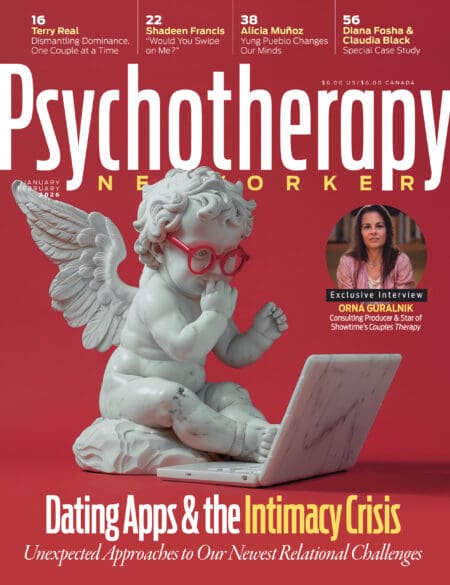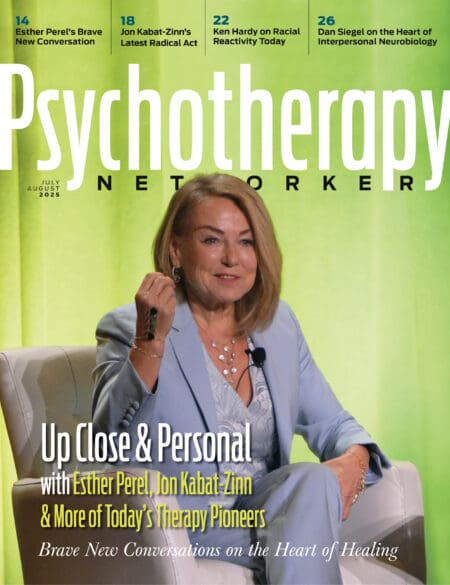Enjoy the audio preview version of this article—perfect for listening on the go.
This article first appeared in the January/February 2006 issue.
There are many ways to say “I don’t know.”
She was a diminutive woman, perhaps five feet tall. When she took the seat across from me in the consultation room, her feet dangled above the floor. Her gray hair was tied back in a bun. Her worried face told a thousand stories.
The call from the Refugee Mental Health Program I’d received about her a few days earlier was similar to many others I’ve gotten through the years: “We’re referring Mrs T., a 47-year-old Hmong refugee woman who’s experiencing low energy, fatigue, and frightening dreams,” the voice on the phone had said. “Two sessions for evaluation, eight sessions for treatment. Submit a treatment plan if you need more.”
Because neither of us had any facility with the other’s language, a translator was always present. Some were young, and like her, Hmong—indigenous people originally from the highlands of Southeast Asia. They were the ones moved to tears by her stories of death and atrocities in Viet Nam and Laos. When she left the room after one session, a young translator in her twenties told me that these were the stories her own parents wouldn’t disclose. Other translators were older, multilingual, from other Southeast Asian ethnic and cultural groups that, I later learned, looked down on the Hmong. They weren’t moved in the same way, sometimes even tending to take control of the session and give advice.
Despite my unfamiliarity with her language, I came to recognize by the second session one recurrent phrase, Kuu tsi paub, which sounded like “Chew Pow” to me. It was always translated, “She doesn’t know.” The phrase was frequently repeated at each session, especially after I asked her a question that started about how long, how many, or how often.
As the Chew Pows multiplied, I considered the possibilities. Was she resistant? Dissociating? Even malingering? I tried to conceal my frustration. A Hmong colleague said that her people were poor historians, that they look at the world in a different way, and that they didn’t think in quantifiable terms.
So we moved on session by session, with the Chew Pows ever present. Bit by bit, her history became clearer to me, and her symptoms of a prolonged post-traumatic stress disorder more apparent—fatigue, nightmares, worrying, avoiding contact with other Hmong families, not cooking for her family. Sometimes, she told me, she felt a “bad wind” around her. Especially telling were her stories: images, repeated in her dreams, of villagers killed and mutilated along the trail of escape; the sound of gunfire and screams in the night; one of her children dying of starvation in the jungle.
Now we were getting somewhere, I thought. I was ready to try some techniques. I suggested that when the dreams awakened her, she should say to herself, “I’m in the United States; the enemy isn’t here and can’t harm me now.” At the next visit, she reported, “Yes, I tried that. I hear your voice when I awake and I’m not so scared. But I still have the dreams.” “How often?” I asked? “Chew Pow.” “Have the dreams changed?” “Chew Pow.”
I asked if she’d leave her dreams with me on an audiotape—give me some of her fears to lock up in the drawer of my desk. She agreed. And so, in the sixth session, she related the content of her dreams, in Hmong, of course. For 30 minutes, she spoke softly, pausing only occasionally. The translator, an older Hmong man, sat transfixed. When the session was over, he was quiet and somewhat pale as he left the room.
At the next visit, I suggested that we listen to the tape and have the translator tell me what she’d said. “No, no need,” she told the translator. “Now you have the dreams and can lock them up.” “Was it helpful to record your dreams?” “Chew Pow.”
After that session, her appearance changed. She came in wearing more colorful, but oddly matched, clothing. Sometimes I saw a slight smile on her face. Her legs would swing gently under the chair as she talked about her children. I asked her if she thought these were good signs. “Chew Pow, but if you think this is important, then I accept it as a good sign.”
I often explain to the family-practice residents I teach that they acquire much knowledge, but some day they’ll achieve understanding—a different way of knowing. Now I began to wonder if there were different levels of not knowing, too? I paid closer attention to each Chew Pow. There were variations. Some were stuttered, some had a flip inflection, others were abrupt. Some seemed angry; others ended in a whine. Clearly she could say “I don’t know” in many different ways, reflecting, I suspect, that she’d come to accept that she really didn’t know or understand many things in many different ways.
Meanwhile, she was sleeping better. “How Long?” “Chew Pow.” The dreams didn’t awaken her as often. “How often?” “Chew Pow.” “What was different?” “Chew Pow.”
She had more energy. She told me she missed the freedom she’d had in her village and the highlands. She told me she didn’t know how to help her children with their homework and feared the influence of the gangs in her neighborhood.
Around the eighth session, knowing that the managed care company would require documentation to authorize further treatment. I asked her if her symptoms had changed. “Chew Pow; but I do know that you’re a good person, and I’ll remember you and will be thankful to you until the day of my death.”
In the ninth session, again seeking to put things in quantifiable terms, I asked about her symptoms again. “Chew Pow. I’m grateful for all you have done, and I’ll remember you in the final hours of my life on the day I die,” she replied. Feeling pressured to satisfy managed care, I tried one last time. “Chew Pow, but I’ll remember all you’ve done, even in the last breath I take in the last minute of my last day.” I chose not to ask again, saving me, and perhaps her, some serious embarrassment. We agreed that she’d return to see me when and if she needed.
It took a while for her words to sink in. This woman had witnessed terror beyond my comprehension, experienced a total disruption of her family and culture, and had been resettled into an incomprehensible new world. Yet she’d determined that I was a good person, was grateful for my help, and would remember me until the day she died—something I’d never expected to hear any patient say. She accepted how much she didn’t know (in many different ways), but she knew I’d helped her, and she was grateful.
Trauma forces us to recognize that there are things in the world that we don’t know and don’t understand. Whom can we trust? What’s really important in life? For what are we truly grateful? After what Mrs. T. had experienced, seemingly nothing could ever be certain again. But recovery isn’t based on knowing how many. It’s based on reconnecting with that which is basic and essential in oneself, in relationships, and in life.
Mrs. T said she’d remember me until the day she dies. I, too, won’t forget Chew Pow and the lessons she taught me. I occasionally pull out her tape and listen. What did she record? Chew Pow—I don’t know. But it really doesn’t matter. It isn’t about the words, it’s about what happened when we were together. She taught me to become more comfortable with not knowing many things, yet staying connected to who my patients are and what’s important to them. Is she adjusting? Yes. How do I know? I can’t tell you how, but I know it’s true. And I’m deeply grateful to her for helping me reconnect with why I do what I do.
Dennis Butler
Dennis Butler, PhD, is a psychologist and professor of family medicine at the Medical College of Wisconsin in Milwaukee, Wisconsin.







